#beren and luthein
Explore tagged Tumblr posts
Text
I Read The Silmarillion So You Don't Have To, Part Seven
Previous part.
Chapter 18: Of the Ruin of Beleriand and the Fall of Fingolfin In which everything goes to hell. Again.
Remember the Siege of Angband? Yeah, that’s still going on. It’s been roughly two hundred years since Morgoth’s last attack (the first appearance of Glaurung the Dragon), and in all that time, the Elves haven’t made much progress. Fingolfin, the High King of the Noldor, considers launching another assault on Angband; his people are strong, and now they have the Men on their side. What Could Possibly Go Wrong?

Fingolfin by Insant
The other Noldor are less enthused by this idea. For once, things are pretty great. Why risk the peace and prosperity that the Elves currently have for the chance at defeating Morgoth, when there’s bound to be massive loss of life either way? Only the Elven lords who live in the far north — on Morgoth’s doorstep — agree with Fingolfin, since they can’t ignore Morgoth as easily. They’re shot down by everyone else, so, there’s peace for a little while longer.
That’s when Morgoth makes his move.
Morgoth has been steadily gathering his forces throughout all of that time, and he’s also grown more and more spiteful. He doesn’t just want to defeat the Noldor, he wants to defile their homeland. But his hatred has also made him impatient.
One winter, on a dark night, without any warning, rivers of lava suddenly come pouring down the Thangorodrim, which belch poisonous gases into the air, rendering the whole plain of Ard-galen a barren wasteland overnight. Also, unlike with natural volcanoes, the damage is permanent — Ard-galen becomes known as Angfauglith, which means “Gasping Dust.” Instant Mordor, Just Add Lava. Many poor Elves are swallowed up by the lava before they can react.
As if that weren’t bad enough, Glaurung returns, accompanied by Balrogs and entire armies of Orcs — more Orcs than the Noldor have ever previously seen. The ensuing battle lasts all winter, as Morgoth’s forces return fire on the Noldor. It becomes known as Dagor Bragollach, the Battle of Sudden Flame.
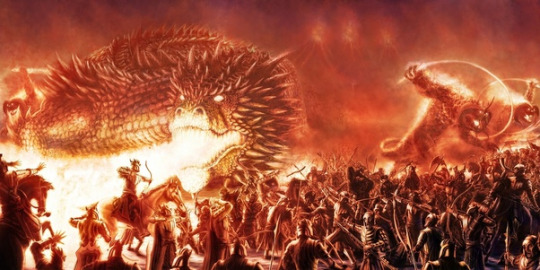
Battle of Sudden Flame by Jovan Delic
There are many casualties. Angrod and Aegnor, the brothers of Finrod and Galadriel, both die in the battle. Finrod himself gets cut off in the Fen of Serech, and almost dies, but he’s rescued at the last minute by a Man named Barahir. Finrod escapes with his life, barely, and manages to make it back to his palace in Nargothrond. Finrod pledges undying friendship to Barahir, promises to help him and his family in return if they should ever need him, and gives him his ring as a token of his promise. It’s a ring shaped like two intertwined snakes, set with green stones, and it becomes known as the Ring of Barahir.
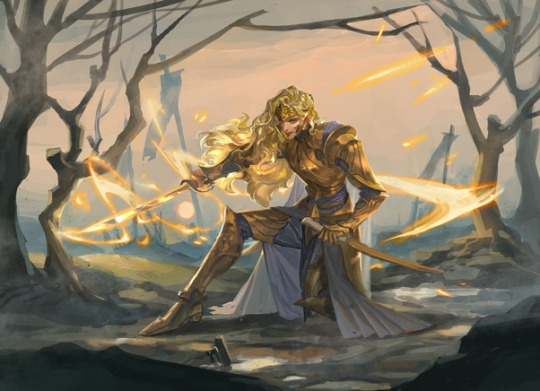
Finrod in the Fen of Serech by pansen1802
Incredibly, Fingolfin and co. manage to hang on to their land of Hithlum, but not without heavy losses. Hador Lórindol, one of the Kings of Men who was Fingolfin’s thane, dies in the battle. In the East, Fëanor’s sons aren’t doing great, either — Celegorm and Curufin are both defeated, but not killed; they retreat all the way to Nargothrond and hide there with Finrod. Caranthir’s land is ravaged, too.
Maedhros, however, “burned like a white fire.” He’s been dying to get his revenge on Morgoth for having strung him up on Thangorodrim, and personally slaughters so many Orcs that they start to run in fear of him. He manages to hang on to his fortress, and many people rally to him, including his brother Maglor.
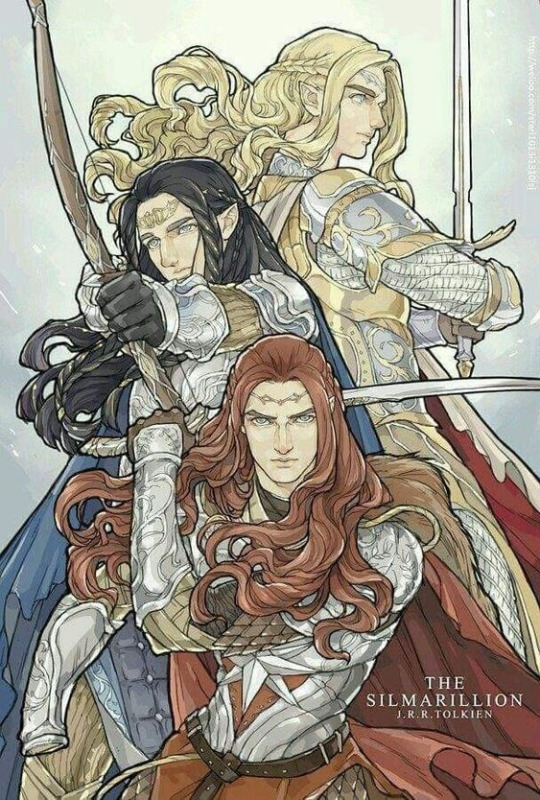
Finrod, Fingon, and Maedhros by star热爱生活呀巴扎嘿
Overall, the battle is really bad. Fingolfin stares out over the ruined lands, sees his family scattered, and realizes the Noldor are done for. He’s filled with rage and despair, but he isn’t ready to give up yet. There’s only one thing to do. He mounts his horse, Rochallor, and rides straight to the gates of Angband. Those who see him think he must be Oromë, the Vala of the hunt, because he burns with fury and his eyes glow. He blows his warhorn, bangs on the gates of Angband, and challenges Morgoth himself to a duel.
That may be the ballsiest move of any Elf so far (and yes, I’m counting Fëanor going up against an army of Balrogs).
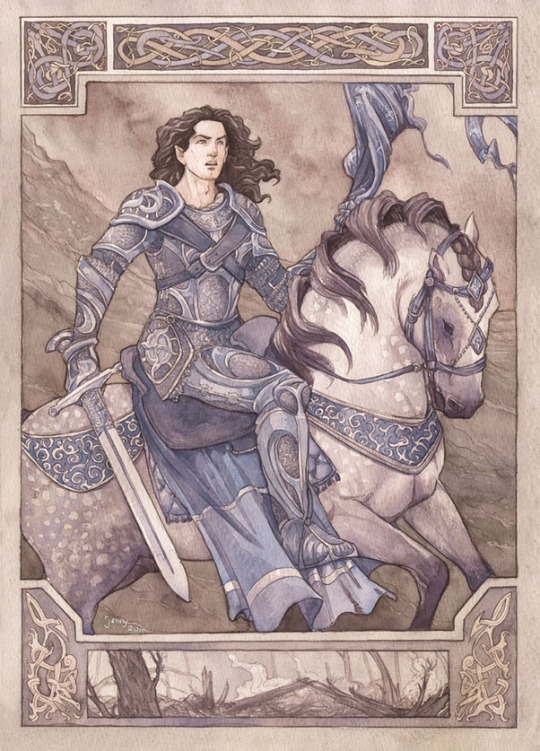
Fingolfin’s Challenge by Jenny Dolfen
Now, throughout all this, Morgoth has spent most of his time hiding in his fortress. Sure, he’s a Vala, and technically the most powerful being in Middle-earth, but he doesn’t fight his own battles. Fingolfin calls him a coward who’d rather send out all of his evil minions to fight for him than come and face him like a man. Morgoth can’t ignore that. So, to the surprise of everyone, Morgoth actually comes. And we get this badass description, which I’m going to transcribe, because I can’t do Tolkien justice:
Therefore Morgoth came, climbing slowly from his subterranean throne, and the rumour of his feet was like thunder underground. And he issued forth clad in black armour; and he stood before the King like a tower, iron-crowned, and his vast shield, sable-blazoned, cast a shadow over him like a stormcloud. But Fingolfin gleamed beneath it as a star; for his mail was overlaid with silver, and his blue shield was set with crystals; and he drew his sword Ringil, that glittered like ice.
Oh, it is on!
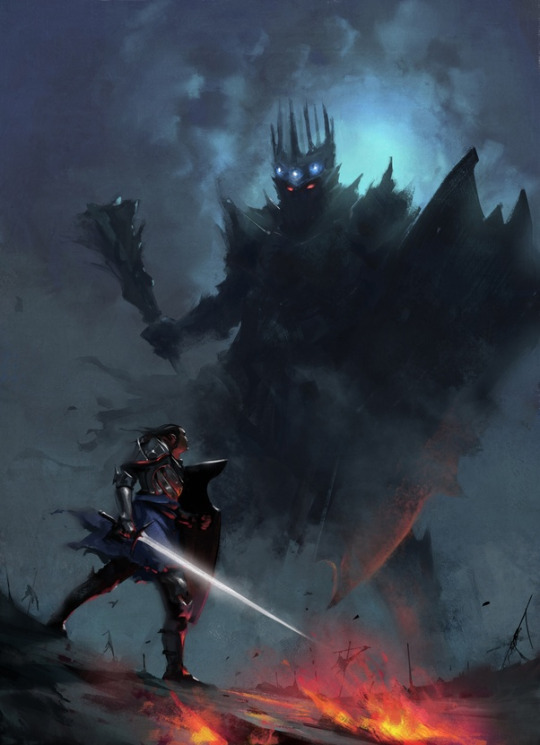
Fingolfin vs. Morgoth by Marchesi

The Fall of Fingolfin by Wavesheep
The battle is epic. Morgoth tries to smash Fingolfin with his hammer, called Grond (GROND! GROND! GROND! GROND!), but Fingolfin is too quick. Every time GROND hits the earth, it creates a volcanic cleft in the earth. The battle is compared to a thunderstorm, with the strikes of Morgoth’s hammer being the thunder and Fingolfin darting around being the lightning. Fingolfin actually manages to wound Morgoth, seven times! Each time, Morgoth howls so loud that all of the Orcs cringe in fear.
Fingolfin can’t keep it up forever, though. He’s mortal, and he’s going up against something near to a god. Three times, Morgoth crushes him with his shield, and three times Fingolfin is able to pick himself back up again. He doesn’t have much space to move anymore, because the ground around him is full of holes. He stumbles and falls, and Morgoth presses his foot to Fingolfin’s neck. It’s like getting an entire hill dropped on top of him. Fingolfin isn’t going to go peacefully, though — with his last bit of strength, he cuts deep into Morgoth’s foot.
Fingolfin dies, and thus passes the strongest and most valiant of the Elven kings. The Elves are so sad to lose him that they don’t even sing about the battle. The Orcs don’t gloat about it, either, even though Morgoth won — it was kind of a Pyrrhic victory, because it’s embarrassing that a mere mortal was able to do so much damage to Morgoth. The reason why we know what happened, despite the lack of songs about it, is because Thorondor (the King of the Eagles) brings the news to Gondolin and Hithlum.
Thorondor also saves Fingolfin’s body from being desecrated by Morgoth. Morgoth goes to throw Fingolfin’s corpse to the wolves, but Thorondor swoops down and claws him in the face. Thorondor brings Fingolfin’s body to Gondolin, and Turgon builds a cairn for his father in the surrounding hills. For a while, Fingolfin’s tomb acts almost like a charm that keeps the Orcs away. (But not forever though. Because, in case you forgot, Gondolin is doomed.)
Morgoth’s wounds are permanent. His seven initial wounds never heal, he now limps everywhere he goes because Fingolfin damaged his foot, and his face is also scarred where Thorondor got him.
All of Hithlum mourns Fingolfin’s death. Fingon, in his grief, becomes the sole High King of the Noldor.
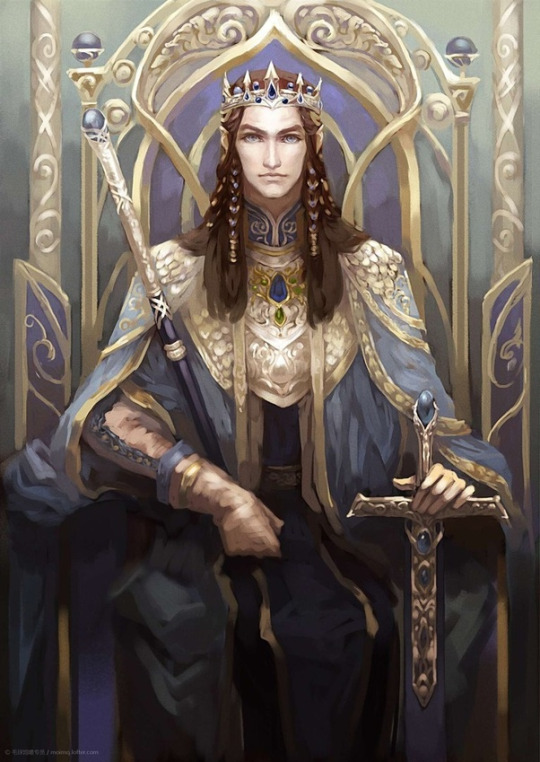
Fingon by Moimq
There’s an interesting note here: Fingon sends “his young son Ereinion (who was later named Gil-galad) […] to the Havens.” This is an outright inconsistency. In other sources, Gil-galad is the grandson of Angrod, Finrod’s brother. So, it’s legitimately unclear who Gil-galad’s father was. Oh well. Distant legendary past, oral tradition and all that. I’m sure the songs disagree on whose parents are whose all the time.
And, the “Havens” referred to here aren’t the Grey Havens, either. They’re two cities in the southwest of Beleriand. But they’re ruled by the same Elf, Círdan, who would rule the Grey Havens later.
Morgoth is now in control of most of northern Beleriand. Barahir, the Man who helped save Finrod, keeps fighting for some time, alongside his wife Emeldir. But Morgoth destroys their land little by little. That land becomes so dark and evil that even Orcs avoid it, and it gets a new name: Taur-nu-Fuin, “The Forest under Nightshade” (which is cool as hell). This forest is like a proto-Mirkwood. Its trees become tangled with claw-like roots and branches, and it becomes full of angry spirits that can drive travelers mad.
The situation gets so dire that Emeldir leads her people away. They end up in the Forest of Brethil, which is where Haleth, another badass warrior-queen of Men, led her people in a similar moment of desperation. All of Barahir’s men are killed fighting Morgoth except for a small handful (whose names are all listed, of course). The Elves don’t come to help them, so they become desperate, hunted outcasts who live in the wilderness. One of these outcasts is Beren, Barahir’s son, who’s about to become very important.
The Elves managed to maintain control over Minas Tirith, the tower that guards the pass separating Morgoth’s lands in the north from the rest of Beleriand. This tower is maintained by Orodreth, Angrod’s son and Finrod’s nephew. But after two years pass, the tower is besieged by Morgoth’s lieutenant, Sauron.
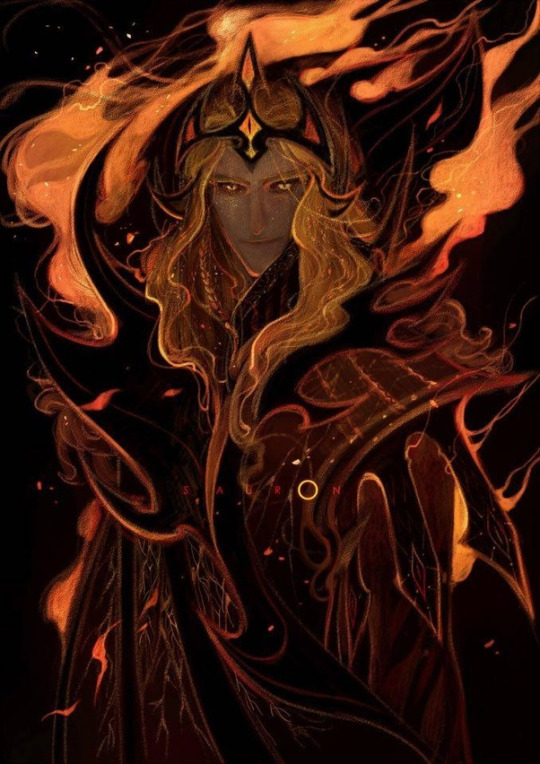
Sauron by Wavesheep
(Oh yeah I’ve been waiting to dip into my self-indulgent collection of Sauron pictures.)
At this point, the Elves call Sauron “Gorthaur the Cruel.” He has become…
a sorcerer of dreadful power, master of shadows and of phantoms, foul in wisdom, cruel in strength, misshaping what he touched, twisting what he ruled; his dominion was torment.
He’s basically like Morgoth 2.0, and there’s very little left of him that is still Mairon, the Maia smith that he once was. Still, Sauron and Morgoth aren’t interchangeable; while Sauron is certainly very evil, he doesn’t think the same way that Morgoth does. If you’re familiar with the D&D alignment chart, Morgoth is pure Chaotic Evil — he doesn’t have a motive beyond fucking things up as much as possible. Sauron is more Lawful Evil, more like an evil dictator. Morgoth wants to watch the world burn (and just did, a moment ago); Sauron wants to rule over the ashes.
Sauron’s assault on Minas Tirith is successful. (If Sauron had a nickel for every time he besieged a tower called Minas Tirith, he’d have two nickels, which isn’t a lot, but it’s weird that it happened twice.) He conjures a cloud of pure terror that causes Orodreth and his men to panic, and flee to Narthothrond. Then, much like Sauron would corrupt Minas Ithil and Osgiliath eons later, he transforms Minas Tirith into an evil watchtower. Tol Sirion, the island where it’s located, becomes known as Tol-in-Gaurhoth, the Isle of Werewolves.
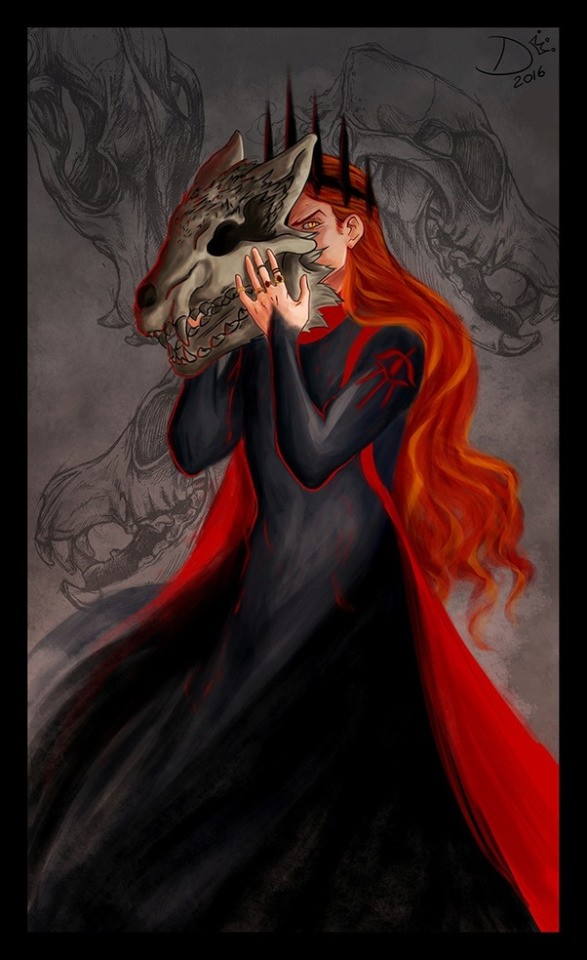
Lord of Werewolves by Dracontessa
After that, things only get worse. The Orcs spread across Beleriand, kidnapping Elves and desecrating all the land around Doriath. Morgoth sends out a bunch of spies to sow discord in every kingdom, hoping to win a psychological battle. Because of the Curse, most of the Noldor believe the sugary lies. The dirtiest trick that Morgoth pulls is setting free some of the Elves that he took captive, while keeping them under his control. This causes the Noldor to distrust even their own families.
With Men, Morgoth tries a different tactic. He attempts to turn them against the Elves by pointing out that the Men are inferior to Elves, and that the Noldor are inherently untrustworthy and untrusting. He promises the Men that if they come and join him, “the rightful Lord of Middle-earth,” then they’ll have honor and rewards and yada, yada. The Men don’t fall for this, which makes Morgoth even more spiteful towards them.
The Three Great Houses of Men are in complete disarray at this point. The house of Bëor —Barahir and his people — is basically destroyed, with the remainder barely surviving in the wilderness. The House of Hador are all stuck in Hithlum, and Hador himself is dead. The only remaining Men in the rest of Beleriand are the house of Haleth — the Haladin — who live in the Forest of Brethil. They’re one of the last lines of defense between Nargothrond and Morgoth’s onslaught. Hador’s grandsons, Húrin and Huor, are camped out in the Forest of Brethil with the Haladin. Halmir, the current leader of the Haladin, sends for backup, and a small army of Sindar Elves from Doriath come to help defend the forest. With the Elves’ help, the Men drive back the Orcs.
Húrin and Huor are some of our major players among the Men. They’re brothers, and they’re currently teenagers. Back before the battle, their father married Halmir’s daughter, so they’re members of the Haladin on their mom’s side. During the battle, they are separated from the rest of their company, but Ulmo protects them with a magical mist from the River Sirion, and then Thorondor rescues them when they wander near his mountains. Thorondor sends two eagles to pick them up, and the eagles bring them to Gondolin. Húrin and Huor become the first Men to ever see the secret Elven city of Gondolin.
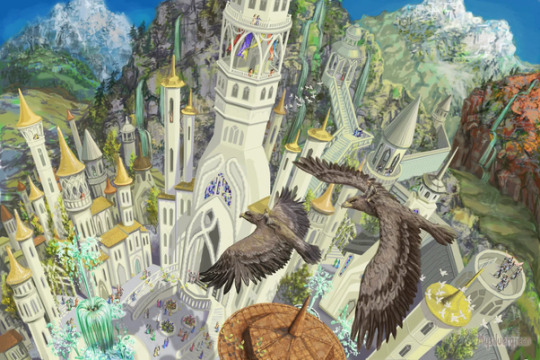
By Mysilvergreen
King Turgon receives them well. He’d gotten a prophetic dream from Ulmo, telling him he’ll need the Men’s help when things get bad, so he takes them in as his honored guests. Húrin and Huor live in the mystical Elven city for a year, and they learn a lot from Turgon in that time. Turgon wants to keep them in Gondolin, not just because of his proclaimation that no one can ever leave it, but also because he genuinely loves them. Eventually, though, they want to go home.
Remember how well that went the last time, with Aredhel?
Húrin reminds Turgon that Men don’t live very long, so he and his brother can’t just wait until things cool off, especially with their family thinking they’re dead. Also, they were carried into the city by eagles, so they have no idea where the entrance is and probably couldn’t find it again on their own. Turgon thinks that this is reasonable, and agrees to let them go, so long as Thorondor is willing to let them leave the way they came, by eagle-taxi.
But Maeglin — remember him? He’s the edgy Elf — Maeglin is happy that Húrin and Huor are leaving, because they’ve been soaking up all the king’s attention. Maeglin snidely tells Húrin that Turgon wasn’t so lenient in the past, like that time he threw Maeglin’s father off the walls.
To pacify Maeglin, Húrin and Huor swear an oath not to reveal anything about Gondolin. As you’ve probably gathered by now, oaths are serious business. I almost guarantee that this is going to bite them in the ass.
When Húrin and Huor return home, their family is overjoyed to see them, because they all thought that the brothers had died in the wilderness. Their father, Galdor, asks where they’ve been, and why they look like princes instead of like they’ve been living in the wilderness for a year. Húrin tells him that the only reason they were allowed to return at all was if they swore not to speak about it, so… don’t ask.
Meanwhile, King Turgon learns that the Siege of Angband is officially over, and Morgoth killed Fingolfin. Turgon doesn’t want to involve himself in the war, at least not yet — Gondolin is a secret safe haven for now, and he wants it to stay that way for as long as possible. It’s like the Wakanda of Elven cities.
However, Turgon also realizes that this is the beginning of the end for the Noldor, unless they can find some outside source of help. He sends secret bands of Gondolin Elves to sail to Valinor. That’s a truly desperate move, since the Noldor are exiles, and Valinor has wanted nothing to do with Middle-earth for centuries. Unfortunately, none of Turgon’s emissaries make it; the western sea has become much more dangerous ever since Valinor cut itself off. The sea is full of enchantments and illusions, and Valinor itself is hidden. There’s no way to get to it. With every failed mission, Gondolin’s doom inches closer and closer.
Guess who hears about it? Morgoth. Morgoth is very interested to know what happened to Finrod and Turgon, because Elven kings don’t just vanish off the face of the earth. He knows they must be somewhere, probably plotting a new scheme to take him down. He knows what Nargothrond is, but not where it is, and he knows nothing about Gondolin. In the Battle of Sudden Flame, he made the mistake of underestimating the strength of the Elves and Men. Although he won the battle, they managed to hit him back just as badly. He’s not about to make that mistake again.
Morgoth attacks Hithlum again. King Fingon is outnumbered, but rescued at the last minute by ships full of warriors sent by Círdan. The Elves win the battle, but King Galdor, Húrin and Huor’s father, dies in the same spot where his own father fell during the Battle of Sudden Flame. Húrin becomes the new patriarch of his house, and serves as Fingon’s thane. He marries Morwen Eledhwen, a woman of the house of Bëor, who fled the Forest under Nightshade for the Forest of Brethil alongside Queen Emeldir.
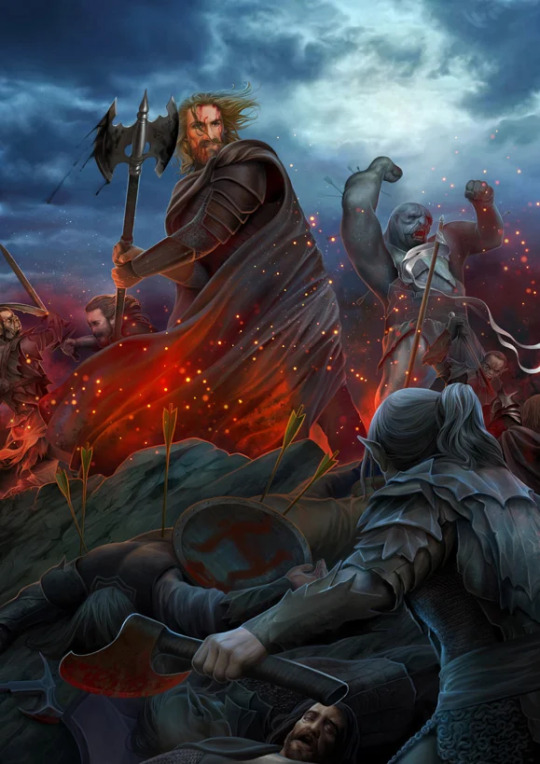
Húrin by Steamey
The House of Bëor is by this point reduced to only one man, Emeldir and Barahir’s son, Beren.
Chapter 19: Of Beren and Lúthien, Part One In which we hear the greatest love story ever told.
This is the first of what Tolkien called “The Great Tales,” some of the oldest stories in the Legendarium, all of which were ultimately unfinished. To put into perspective just what a big deal this story is, Tolkien and his wife Edith have the names “Beren” and “Lúthien” written on their respective headstones. The version here in the Silmarillion is the most complete, but it’s also an abridged version. This is how Tolkien introduces it:
Among the tales of sorrow and of ruin that come down to us from the darkness of those days there are yet some in which amid weeping there is joy and under the shadow of death light that endures. And of these histories most fair still in the ears of the Elves is the tale of Beren and Lúthien.
Most of my retelling here is paraphrased from the Silmarillion, but I’ve included some details that appear only in the Lay of Leithian, Tolkien’s unfinished poetic telling of the story. It’s really worth going and reading the Lay of Leithian; it’s extremely vivid and evocative, it perfectly imitates the medieval poetic form.
The story doesn’t actually start with Beren. It starts with an account of what happened to Barahir and his remaining men after they fled the Forest under Nightshade. They ended up camping out beside a lake called Tarn Aeluin, which is beautiful and reflects the stars. It was supposedly blessed by Queen Melian, and her magic repels the evil creatures that took over the rest of the forest. Barahir and co. are well hidden there, but Morgoth commands Sauron to find them.
One of Barahir’s people is a man named Gorlim, who has a wife, Eilinel. They love each other even despite the war, but when Gorlim returned home one day after a battle, he found his house empty and Eilinel gone. He still follows his people and hides out near the lake, but he holds out hope that maybe his wife isn’t dead. He periodically leaves the secret safe haven and returns to the empty house, hoping that his wife will be there. One time, he sees the lights on and hears her voice, but it’s a trap — Sauron found him. Sauron tortures Gorlim to force him to reveal the location of Barahir’s secret camp, but Gorlim holds out. That is, until Sauron tells him to name his price. Gorlim asks to see his wife again.
Then Sauron smiled, saying, “That is a small price for so great a treachery. So shall it surely be. Say on!”
Poor Gorlim reveals the location of Barahir’s camp. Then, with a mocking laugh, Sauron reveals that Eilinel is dead, and that he cast an illusion to ensnare him. “Oh, but don’t worry, I’ll still send you to her,” he says, and then kills him. They don’t call him Gorthaur the Cruel for nothing.
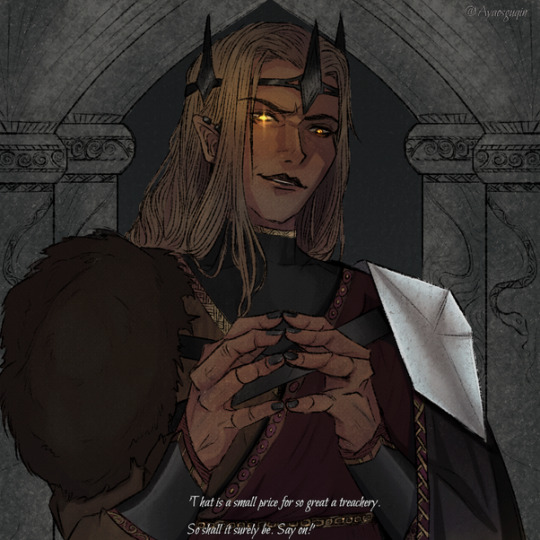
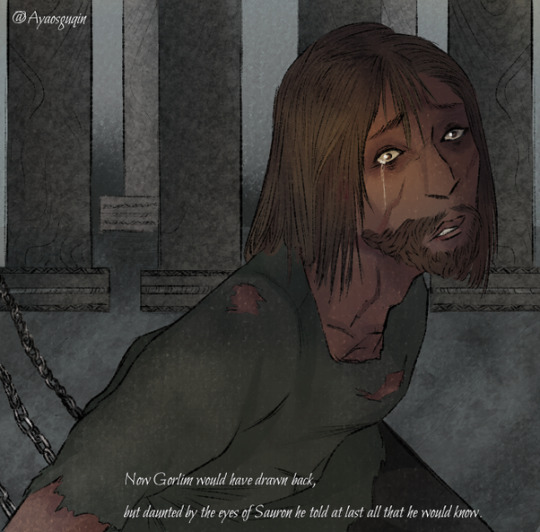
By @ayaosguqin
See, this is one of the things that makes Sauron different from Morgoth. Morgoth is spiteful and enjoys sewing discord and causing destruction for the sake of it, but we haven’t seen this kind of calculated sadism from him yet. (There’s not much that’s subtle about busting in with a giant spider and killing trees.) Sauron, having been a Maia of Aulë, has an appreciation for subtlety and craftsmanship. Sauron likes to stick the knife in and twist it. And as The Lord of the Rings makes clear, he’s a master of psychological warfare.
Now that Sauron knows where the secret camp is, his forces attack the men at Tarn Aeluin. They massacre everyone, save Beren. Beren is out on a spy mission when the Orcs attack, and he has a dream in which Gorlim’s ghost appears to him to tell him what happened. Beren rides back, but it’s already too late. He finds his father and everyone else dead.
Beren builds a cairn for his father and swears vengeance. He hunts down all the Orcs, slaughtering them by himself. He sneaks near their camp, where they’re gloating and holding up his father’s hand as a trophy. On the severed hand is a ring, the ring that Finrod Felagund gave to Barahir. Beren swoops in, steals the hand with the ring, and runs off before the Orcs have a chance to react.
Beren lives by himself in the wilderness for some time. He befriends the animals, and becomes a vegetarian as a result. He manages to perform many heroic deeds just in that time, so that he becomes famous. He’s already such a legend that Morgoth puts a price on his head, just as high as that of King Fingon himself, but the Orcs are so afraid of Beren that they avoid him instead of hunting him. Morgoth resolves to send an entire army after Beren, and not just any army — an army of werewolves, captained by Sauron himself.
The werewolves are enough to chase Beren away from the land where he buried his father. He heads south, towards Doriath. He resolves to pass through Queen Melian’s magic wall, for some reason. (Maybe because it’s the only guaranteed safe place?) He travels along sheer mountain cliffs, and through the spider-infested wastes that had been twisted by a combination of Sauron’s magic and Melian’s magic. That land was basically the Mordor of its day, and no one knows how Beren got through it; whatever he experienced there was terrifying enough that he never spoke of it again. When he arrives at the magic wall, he passes right through like it isn’t even there. This event had been predicted by Melian herself: ‘because the power of that Man’s destiny will overcome her own. People will sing about that event until the distant future, when Middle-earth is unrecognizable.’
He finds himself in the north of Doriath, a forest called Neldoreth. He’s exhausted and harrowed, having spent years traveling through a cursed land. But everything in Neldoreth is beautiful, it’s summertime, and Beren sees a beautiful Elf maiden dancing on the grass. It’s Lúthien, the daughter of King Thingol and Queen Melian themselves. Lúthien is the most beautiful person alive. (Like, metaphysically.) Being the child of a Maia, she is more or less a demigoddess.

Encounter of Beren and Lúthien by Elena Kukanova
Beren is instantly smitten. In fact, he’s literally enchanted by her — just watching her casts a spell on him. When she suddenly vanishes, he literally can’t speak. He wanders the woods like an animal, searching for her. He doesn’t know her name, so he calls her Tinúviel, which means “Nightingale” in Sindarin. A whole year passes, and he sees her in the beauty of nature around him, like she’s a ghost and he’s fondly recalling her memory. A whole winter later, she reappears, and sings a song so beautiful that it brings spring back to the woods:
Keen, heart-piercing was her song as the song of the lark that rises from the gates of night and pours its voice among the dying stars, seeing the sun behind the walls of the world; and the song of Lúthien released the bonds of winter, and the frozen waters spoke, and flowers sprang from the cold earth where her feet had passed.
When he hears her song, Beren can suddenly speak again. He calls out to her, using the name “Tinúviel.” Luckily for him, Lúthien falls just as in love with him upon seeing him. The narrator says that “doom fell upon her” as soon as she loved him back, which could mean either that she met her destiny or that she is going to die for her love. Probably both.
Beren goes to embrace her, but she vanishes again as soon as day breaks. Beren immediately feels a mixture of ecstasy and anguish. He falls into a coma, and has nightmares about groping through the dark to find the
vanished light. (I’m starting to note parallels between Lúthien and the Two Trees, and also the Silmarils.) But Beren’s anguish is nothing to Lúthien’s. Now that she’s fallen in love with a mortal, her fate is inextricably intertwined with his. She’s no longer free.
Lúthien returns to Beren and wakes him from his coma. They walk through the woods together, blissfully in love, throughout that spring and summer. Presumably they talk and actually get to know each other in that time.
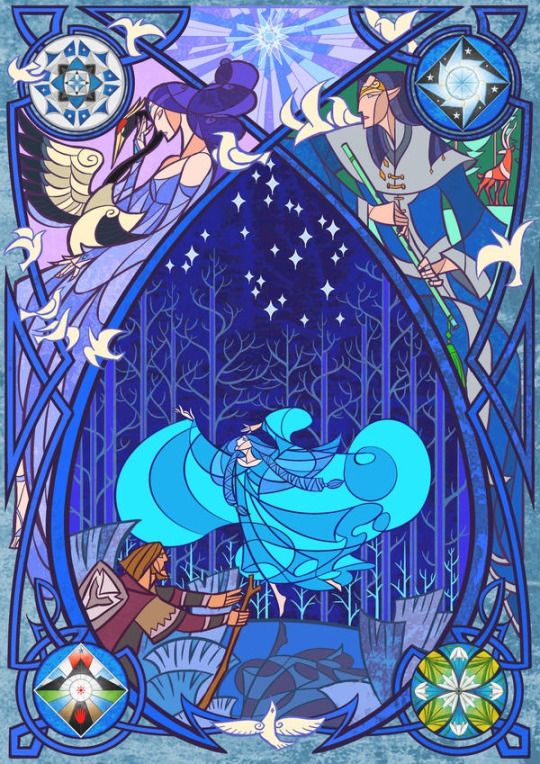
A sudden in love by breath-art and aglargon
There’s another person who loves Lúthien, an Elven bard named Daeron. He spies on Beren and Lúthien in the woods. Jealous that Lúthien loves Beren instead of him, he goes and tattles to Thingol about their relationship. (In the Lay of Leithian, Daeron — in his envy — is able to cast a spell of silence upon Beleriand, so that there is no music or even birdsong.) Thingol is immediately furious, because he’s extremely overprotective of his daughter, and he hates Men. He confronts Lúthien about her new boyfriend, but she refuses to say anything until Thingol promises that he won’t hurt or imprison Beren. Lúthien personally leads him before her father’s throne.
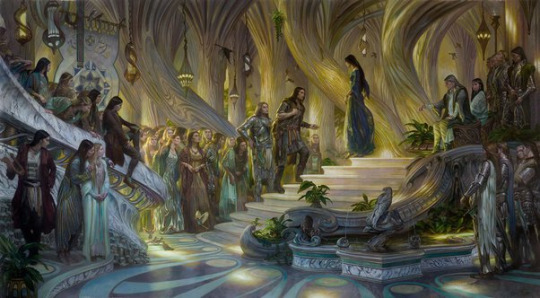
Beren and Luthien in the Court of Thingol by Donato Giancola
Thingol demands to know who Beren is, but he’s so intimidating that Beren is stunned into silence. Lúthien answers for him. Thingol tells Lúthien to back off and let Beren speak for himself. What’s Beren’s excuse for entering the forbidden realm of Doriath? Beren’s response is very poetic and eloquent, but basically boils down to “I want to fuck your daughter.”
There’s pin-drop silence in the hall as the assembled Elves wait for Thingol to smite Beren. Thingol immediately regrets his promise not to harm him. Thingol’s response is to fold his hands, smile coldly, and say,

(I mean, it’s not these exact words, but it’s close enough.)
Thingol accuses Beren of being a spy and a thrall of Morgoth, at which Beren takes offense. Beren isn’t afraid of death, but he won’t allow himself to be insulted by any Elf, even a king. His father was a lord of Men and he deserves to be treated like a prince! He has a ring given to his father by Finrod himself, for Eru’s sake! He holds up the ring, and all the Elves see it. This is the Ring of Barahir, which will eventually get passed down to Aragorn. The jewels set in it were originally cut by the Noldor in Valinor itself.
Melian whispers to her husband that he won’t be the one to kill Beren. Beren has a lot more stuff he’s destined to do, but his destiny is still intertwined with Thingol’s. Whatever Thingol does next will seal his own fate, too. Thingol proceeds to choose the stupidest thing possible.
Beren wants to marry the Faerie King’s daughter. So, as is common in fairy tales, Thingol sets him an impossible task that he must complete to earn Lúthien’s hand: He must steal a Silmaril from the crown of Morgoth. Thingol feels like this the nearest thing to a fair price for his daughter. Of course, like most mythological kings, he’s hoping that Beren will die in the attempt.
You can just hear Melian’s facepalm through the page.
As is hopefully clear by now, the Silmarils are like a bomb waiting to go off. Everything about them is fraught — from the fact that they contain the last light of the Trees, to Morgoth’s obsession with them, to the Curse laid on all Fëanor’s sons for their unbreakable oath to get them back, etc. etc. Thingol’s choice to get involved in that shitshow was a dumb fucking idea. It’s not really his place to say or do anything concerning the Silmarils, and he effectively dooms his own kingdom by involving himself with them. In fact, by doing so, Thingol subjects himself to the same Curse that affects all the Noldor — you know, the reason he banished them from his kingdom and banned their language in the first place.
But that’s getting ahead of ourselves. Let’s get back to Beren, who responds to this by literally laughing it off and calling it easy:
“For little price,” he said, “do Elven-kings sell their daughters: for gems, and things made by craft. But if this be your will, Thingol, then I will perform it. And when we meet again my hand shall hold a Silmaril from the Iron Crown; for you have not looked the last on Beren son of Barahir.”
I like the parallelism here: Both Beren and Sauron call something that’s extraordinarily valuable to someone else a “little price” or “small price.” Obviously, we’re supposed to side with Beren in this instance, but I wonder if his pride will be his fall.
Having received his main quest, Beren leaves Menegroth.
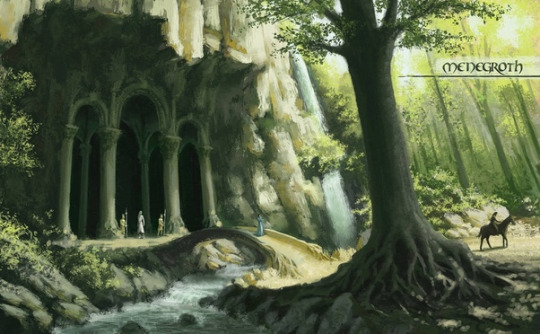
Menegroth by David Gresit
Melian tells Thingol what an idiot he is for involving himself in the Main Plot and forsaking his kingdom’s safety in isolation. She can’t protect him from whatever happens next. Thingol is pretty confident that Beren’s going to die, which proves that he’s not Genre Savvy enough to make good decisions from here on out. He should really listen to his wife.
Lúthien doesn’t quite enter “but Daddy, I love him!” territory, but she does stop singing. All of Doriath is eerily silent.
Beren travels west, towards the River Sirion, and then to Nargothrond. Being alone and with no resources, he doesn’t have any other option but to go to Finrod for help. He wisely holds up the Ring of Barahir as he enters Finrod’s territory, because it was originally Finrod’s ring, and his Elf snipers would know not to shoot. Knowing that he was being watched by an army’s worth of hidden Elves, he randomly yells out “I am Beren son of Barahir! Take me to your King!” in the middle of a field in the hopes that someone will hear him and decide not to kill him. After doing this several times, he’s apprehended by the archers and taken to Finrod.
Finrod receives Beren warmly. Privately, Beren tells Finrod about his father’s death and about meeting Lúthien. He cries more over remembering Lúthien than remembering his father. Remember, Finrod promised to help Barahir or any member of his family in need, because they had saved him. So, he has no choice but to help Beren retrieve a Silmaril, even though he knows it will not go well.
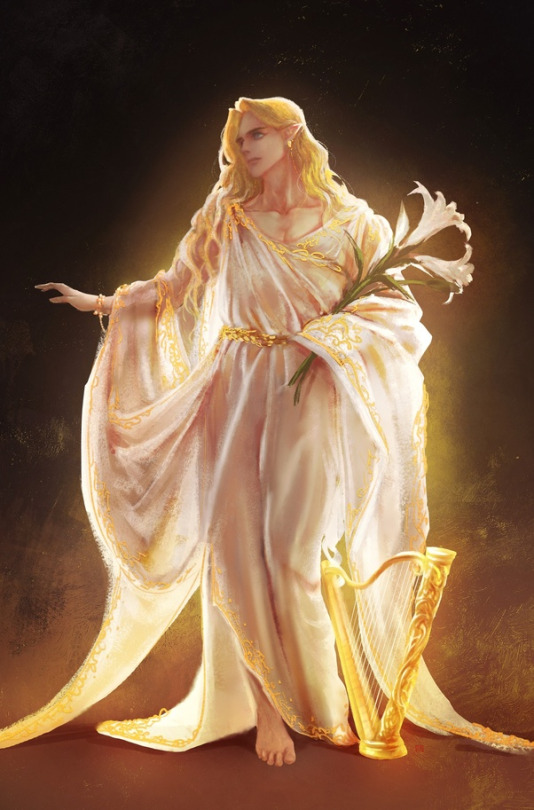
Finrod by yidanyuan
He tells Beren, ‘Well, it’s obvious that Thingol wants you dead, but if anyone so much as mentions the Silmarils, the sons of Fëanor are on them like a pack of wolves. Celegorm and Curufin are powerful lords in my court, and I can’t risk antagonizing them. If they find out you want a Silmaril, they’ll kill you. But I made a promise to your father, so I have to help you. In short, we’re all screwed.’
For some reason, Finrod decides that the best thing to do is to be as transparent as possible. So, he summons his court and stands before his people. He tells them all about the promise he made to Barahir, and how he is therefore obligated to help Beren. He asks his lords for help. Celegorm’s response is predictable. He repeats the Oath of Fëanor, reaffirming that the sons of Fëanor will hunt down anything alive that dares to seek a Silmaril. He goes on a tirade as impassioned as the one that Fëanor originally gave to the Noldor back in Valinor. (Like father, like son, I guess.) Then Curufin speaks, more quietly. What he says boils down to: ‘Nice kingdom you’ve got here, Finrod. Would really be a shame if something happened to it.’
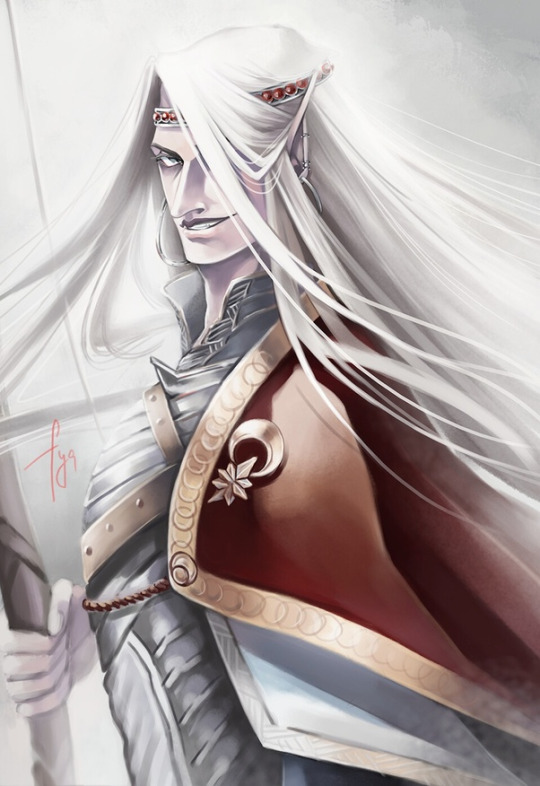
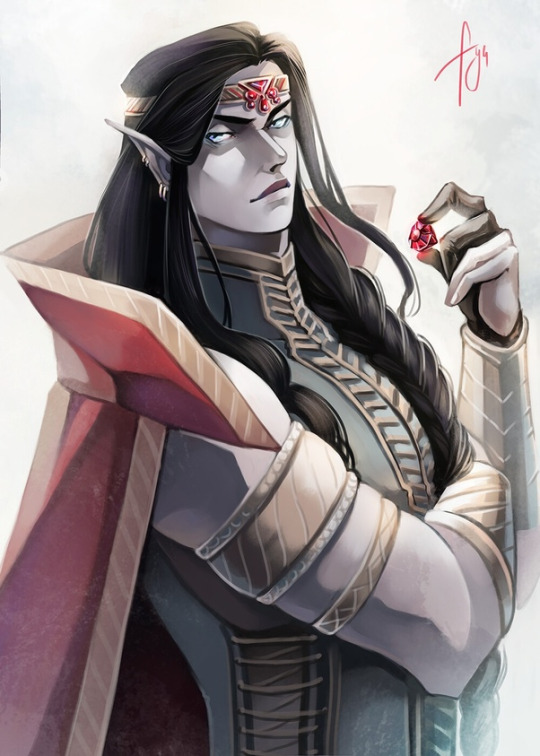
Celegorm and Curufin, by Julia Reizen
Curufin’s speech scares the Elves of Nargothrond so much that they avoid open war for decades, preferring guerilla warfare with arrows, poisoned darts, and magic. According to Tolkien, this is less valorous than open combat, and diminishes their whole society.
Say what you will about Fëanor and his brood, they’re damn good at public speaking.
The Elves of Nargothrond begin to murmur amongst themselves that Finrod can’t tell them what to do as though he’s a Vala (even though he’s… y’know… the king), and all of them refuse to help him. The Curse is in full effect: Celegorm and Curufin realize that this is a golden opportunity to send Finrod alone to his death, and take over Nargothrond for themselves.
Finrod reads the room. He takes off his crown, and throws it at his feet, renouncing his rulership of the kingdom that he built. He looks directly at Celegorm and Curufin and tells them that while they may be faithless bastards who will break their oath of loyalty to him, he will not break his own promise to Barahir. He addresses the rest of the room — there’s got to be at least a few people who haven’t been affected by the Curse, and who will follow him, so that he isn’t pathetically driven out of his own kingdom. Right? A grand total of ten people stand up for him. One of them, Edrahil, picks up Finrod’s crown, and says that it should be given to a steward instead of being left for Celegorm and Curufin to snatch. Whatever happens, he says, Finrod is still the true king of Nargothrond. #IStandWithFinrod.
Finrod chooses Orodreth, his nephew (or youngest brother; sources differ), as his steward. Celegorm and Curufin just smile and withdraw from the room, which isn’t creepy at all.
Finrod and Beren leave Nargothrond with their ten loyalists. They travel north, come upon a band of Orcs, and kill them all. Finrod uses a magical illusion to disguise his company as Orcs, and they sneak through the mountain pass towards Angband. Sauron finds them anyway, and intercepts them. Sauron and Finrod engage in — of all things — a singing competition. It’s very similar in principle to “the oldest game” from Neil Gaiman’s The Sandman, in that it’s a battle between dueling concepts that are instantaneously manifested as the singers describe them. Sauron sings about treachery, betrayal, uncovering secrets, piercing through things, and sorcery. Finrod answers with a song about resistance against evil, keeping secrets, maintaining trust, standing strong, and gaining freedom.

Finrod and Sauron by rami-fon-verg
There is something simple, almost childish, about this back-and-forth. I feel like I’ve seen several different children’s shows in which a good character and an evil character sing at each other instead of fighting, with the evil character extoling the virtues of power and the good character singing about the importance of love. (The one that comes to mind is Barbie and the Diamond Castle, in which the two heroines and the villain play good/evil music at each other, and the good music overpowers the evil music, resulting in the villain’s defeat.) I wouldn’t be surprised if several anime have a scene like this, as well. And yet, it is primordially powerful, like Gaiman’s “oldest game.” In Tolkien’s universe, singing was what created the world in the first place, and singing is therefore a direct and powerful means of manifestation.
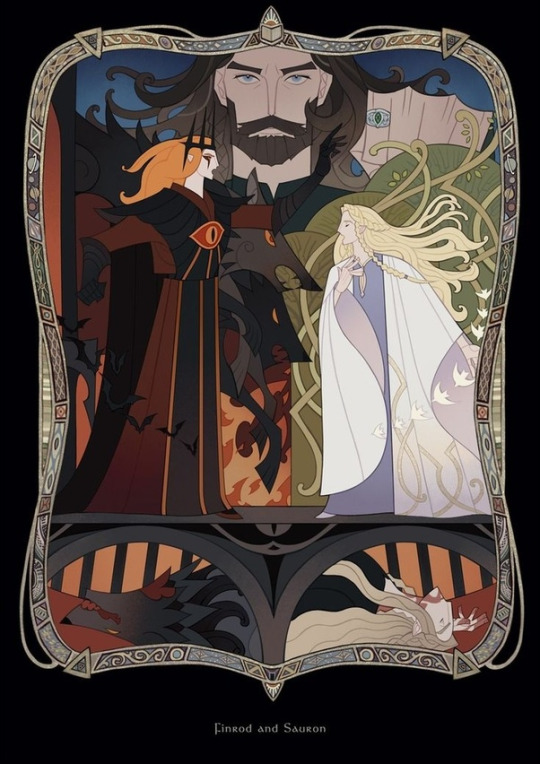
By Wavesheep
Unfortunately, it does not end the way it would if this were a Barbie movie or an anime. Finrod is a great singer, but Sauron is better — he is a Maia, one of the Ainur, meaning he was there when the original Music of creation was sung. It’s impressive that Finrod manages to hold out as long as he does, but in the end — much like Fingolfin and Fëanor before him — he loses.
To tell this part of the story, Tolkien randomly switches to verse; he quotes a section from the Lay of Leithian. Medieval texts actually do this; lots of them will randomly switch between prose and verse. Texts that do this are called “prosimetric.” For example, in the Volsung Saga (which reads very much like The Silmarillion), when Sigurd meets Brynhild, the text abruptly switches into verse as she lists all the different types of runes and their uses. There’s several other instances in that text when it randomly switches between prose and verse. It prefaces the verse parts with something like, “So saith the song of Sigurd,” referencing poetic versions of the same story that otherwise don’t survive. Tolkien evokes that same structure here, right down to saying “as it is told in the Lay of Leithian.”
The Lord of the Rings is prosimetric, too, but most of the songs are diegetic, meaning they’re actually being sung by characters in-universe. That’s not what’s going on here. The verse part describes the singing contest between Sauron and Finrod, it’s not the actual songs that they’re singing. But it’s really clever of Tolkien to switch to verse to describe this scene, because it sets the vibe! It’s like you’re listening to a distant echo of their songs, passed down through generations of oral storytelling. It wouldn’t be nearly as evocative if he just described the scene flatly in prose.
Thank you for indulging me in that tangent! Moving on: Sauron throws Finrod and co. into a dark pit, and threatens to kill them if they don’t tell them who they are and why they’re there. Periodically, he sends a werewolf to eat one of them (which, I’ll bet you anything, is a direct reference to the Volsung Saga). Still, none of them talk.
Meanwhile, back in Doriath, Lúthien intuitively senses that something is wrong, and asks her mother what has happened to Beren. Melian tells her that Beren is in Sauron’s dungeon. Lúthien resolves to go and rescue him by herself. She goes to ask Daeron for his help, but Daeron refuses to risk his own neck for Beren’s sake. He’s been afflicted with full-on incel syndrome, so out of spite, he snitches to Thingol a second time. (Thingol is so grateful that Daeron keeps tabs on his daughter for him, that he names Daeron a prince. Make of that what you will.) Thingol can’t imagine anything worse than letting his daughter waste away in a dark pit, so he builds a house in a giant beech tree, called Hírilorn. Because the best way to keep your daughter safe from one prison is to put her in another! Logic!
Well, it’s a common trope in myths and fairy tales: The king is overprotective of his daughter and puts her in a tower, or a box with a hole in the roof, or some such. Lúthien, however, is proactive. She doesn’t wait for someone to rescue her from her treehouse. Instead, she tricks her guards and Daeron into sending her a golden bowl of wine, a silver bowl of water, a spinning wheel, and a loom. Then she sings a spell that mentions all the tallest and longest things in the world, which causes her hair to grow extremely long. She mixes the wine with the water, then sings a song of day over the golden bowl, and a song of night over the silver bowl. Finally, she sings a song of sleep. The singing enchants her hair, filling it with corresponding ideas that shape the way Lúthien wants it to behave. (Similar to Sauron and Finrod’s magic songs, singing about an idea causes it to manifest.) She weaves a robe out of her hair, a robe that’s described as being misty and shadowy, like it’s woven from clouds at night. Lúthien weaves a rope out of what’s leftover, and puts a sleeping spell on it. Then she just throws it down onto the guards at the foot of the tree, and they go to sleep, allowing her to climb down the rope and escape.

Lúthien prepares her escape from Hírilorn by Anke Katrin Eißmann
As she leaves Doriath, she comes upon Celegorm and Curufin, of all people. They’re out hunting, hoping to learn something about what happened to Finrod (and probably plotting behind his back the whole time). Among their hunting dogs is a particularly large wolfhound called Huan, who actually came with them from Valinor. Oromë himself, the Vala of the hunt, gave the dog to Celegorm long ago. Huan loyally followed Celegorm into exile, and therefore became automatically subject to the Curse. He’s foretold to die, but only after he faces the biggest and baddest of big bad wolves.
Spoiler alert, the dog’s gonna die!
Huan finds Lúthien, because he’s immune to her enchantments, and brings her to Celegorm. Once she learns that Celegorm and Curufin are enemies of Morgoth, Lúthien decides that she trusts them, and reveals herself to them. Celegorm (or, in the Lay, Curufin) instantly falls in love with her, because… of course he does. He offers to help Lúthien, making a point not to say that he already knows about the quest. Lúthien goes with them to Nargothrond.
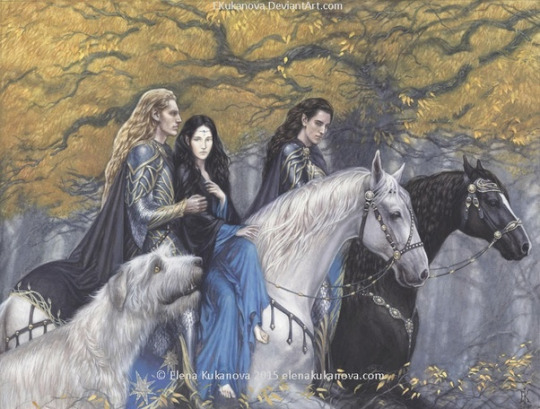
Celegorm and Curufin find Lúthien by Elena Kukanova
As soon as they get there, Celegorm and Curufin show their true colors. They imprison Lúthien, take away her magic cloak, and forbid her to speak to anyone else but them. Lúthien escaped one trap, and fell right into another. Now that the brothers know from Lúthien that Finrod and Beren are in Sauron’s prison, they figure that it’s easiest to just let them die. Nargothrond is as good as theirs. And now that they have Lúthien, they have leverage over Thingol — they can force him to give Lúthien’s hand in marriage to Celegorm. That would make Celegorm and Curufin the most powerful princes of the Noldor! [Insert evil laugh here.]
Huan, however, is the Goodest Boy and is too pure-hearted to follow Celegorm (even though Celegorm is his beloved master whom he’s been serving for literally centuries). Huan also fell in love with Lúthien upon seeing her for the first time, but in a decidedly less creepy way. He comes to her prison every night to keep her company, and Lúthien tells him all about Beren.
Huan decides to help Lúthien break out. He brings her magic cloak to her, and speaks to her (he’s only allowed to talk three times before he dies). He shows her a secret passage out of Nargothrond, and they escape together. Huan even swallows his pride enough to allow Lúthien to ride on his back.
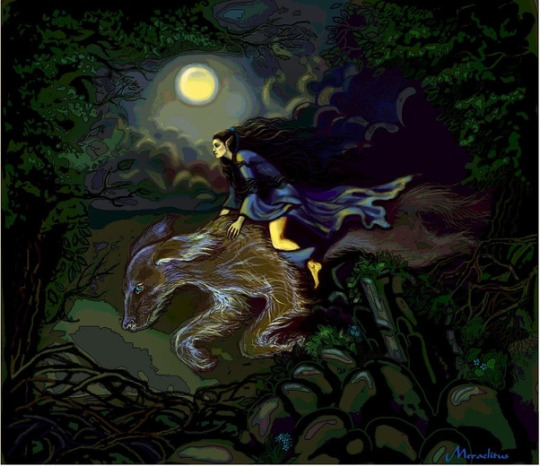
Lúthien riding on Huan by Meraclitus
I mean, if you’re gonna be a damsel in distress, a dog is a pretty awesome thing to be rescued by.
(Stopping there, because I'm running up against the max number of images. More to come!)
#the silmarillion#the silm#silmarillion#silm art#the silm art#the silm fandom#silm fandom#beren and luthien#fingolfin#morgoth#beren#luthein#luthien#finrod felagund#celegorm#curufin#thingol#melian#sauron#tolkien#jrr tolkien#j.r.r. tolkien#middle earth#long post
77 notes
·
View notes
Text
WOAH WOAH WOAH! I know some headcanon that Daeron is brother to Luthien, but I'm listening to 'Beren and Luthein' on an audibook and I'm either senile or the narrator said (about Tinuviel and Daeron) "Their father"!
Am I crazy!? I must investigate!!! I'll return!
11 notes
·
View notes
Text
A non-comprehensive list of luck symbols based on first age events:
7 wounds (Fingolfin's fight with Morgoth; resistance to evil, justice at great cost, defiance, courage in single combat)
The snapped chain (Finrod; escape from bondage/captivity, selfless defense of friends)
The Shadow Cloak (Luthein's cloak; secrecy, passing safely unseen)
Honorable Theft (Beren's hand holding a silmaril; a good luck charm for burglars and thieves, but also used for the recovery of stolen things and for engagements.)
Fairy Girdle (Melian's Girdle; safety charm for home/territory)
The Enduring Fortress/True Defiance (Himring/Tol Himling as a star fort; Enduring Fortress is the early 2nd age version. True Defiance is the later, and includes water surrounding the fortress)
The Watchful Hound (Huan; protects women's chastity. The Guiding Hound is an alt version that watches over lovers. Watchful shown laying down, Guiding shown standing or running.)
Swift Mercy (originally Orome's Mercy; bloody dagger)
Freedom At Any Cost (severed hand; unclear if derived from Maedhros or more collective cultural memory of escaped thralls. ften seen combined wit hthe Snapped Chain)
The Sheltering River (gondolin, nargothrond, ulmo; a bow in a river with about the same meaning at the Fairy Girdle. Not uncommon to see them combined.)
The Fostering King (an amalgam of Thingol and various Noldor lords who fostered human children (including for politics), although third and fourth age versions tend to be linked to Elrond; visually diverse, an all-purpose protective symbol for children)
The Seven Sons (some ultra-simplified mother and seven children/babies design; because it would be very funny to me if Nerdanel became a good luck symbol of childbirth among mortals without ever stepping foot outside Aman)
fibgolfin's seven blows against morgoth surely becomes a visual/heraldic motif in war of Wrath beleriand / second age Lindon. Especially if gil-galad is fingon's son, but I bet elros (& descendants) and elrond would get some use out of it, plus any of fingolfin's old retainers who survived and stayed in middle earth.
133 notes
·
View notes
Text
ok, someone please tell me that Beren and Luthein stole the middle silmaril from Morgoth. please. if they didn't, the crown would be uneven and i will cry. in my opinion if they stole one of the side ones that would be a horror that no one should have to endure
#if they stole a side one i don't think the silmaril should have suffered berens touch#i said what i said#beren and luthein#the silmarillion
0 notes
Text
If there is one thing I would love to see it’s Lúthien, Dior, and Túrin being done with Thingol and Melian’s shit from the afterlife. Just...side eyeing a particular comment on beren, or eye rolling at them lamenting Luthein’s death as if they didn’t set the actions that made her mortal into play BY SENDING HER BOYFRIEND TO DIE FOR A ROCK. She and Beren were cool to just spend their time together but the elves in their lives (with the exception of finrod who already fucked up one beorian’s elf romance) made their lives WORSE.
But also....just imagine cool uncle/cousin Túrin with Dior. Teaching him all the edain facts he knows Dior wouldn’t know now that his parents are gone. Dior being the only person in dorirath that speaks Taliska with Túrin (Luthien actually was really interested in learning “Beren’s language” in a couple drafts. It’s possible that might have been Dior home language not Sindarin lol), they celebrate edain holidays together, Dior misses him when he’s gone. Truly mourns him when he dies.
Just....the dynamics left unexplored.
5 notes
·
View notes
Photo

So I started to play Lord of the Rings Online as a stress relief.
My first character was a dwarrow miner named Torvild on the Crickethollow server, but I really had no idea what I was doing.
So I made a cute little Hobbit Ministerial, Lumdinhilda, on the Laurelin server because I’d been informed it was an RP server. The issue is that I’m honestly too shy to just walk up to someone ( even with the RP tag ) and just . . . start RPing haha ;;
My hobbit lass isn’t likely to leave the Shire anytime soon. There is a lot to see and do ( for me ) and she’s the kind of Hobbit who thinks going to Bree is an Adventure.
She’s singing the ballad of Beren and Luthein, translated loosely into Westron. She loves Elvish love ballads-- though the patrons of the Inns aren’t as big of fans. The Innkeepers routinely tell her off for playing such sad, slow tunes.
“Wouldn’t you rather playing something more cheery, dear?”
Her most hated words!
Anyone up for playing with a newbie? I’ve read a lot of the essays and ‘rough’ guides.
P.S. If you’re wondering where the hair on her feet is, I had meant to color this and just use colored lines to signify her thick curly hobbit foot hair. That . . . didn’t happen.
6 notes
·
View notes
Photo
Listen the 2 ballsiest motherfuckers in all of Arda are Beren and Luthien okay?
Luthien charmed the manifestation of evil to sleep and beren fucking got his hand bitten off by the king of werewolves and showed up to his beloved's father to drop that one liner.
When he died Luthien marched straight to fucking Valinor and up the mountain where Manwe sat and pleaded with him to let her boyfriend go.
Luthein and beren had balls of fucking titanium and nothing could stop them


The best interaction that ever happened in middle earth
14K notes
·
View notes
Photo




Again she fled, but swift he came. Tinuviel! Tinuviel! He called her by her elvish name; And there she halted listening. One moment stood she, and a spell His voice lay on her: Beren came, And doom fell on Tinuviel That in his arms lay glistening.
60 notes
·
View notes
Text
Aragorn is a sweetheart. I've always loved him. (Admittedly, the Beren and Luthein 2.0 thing is a big contributing factor to that.) Oh no yeah, I love Karl more than Vig. But when it comes to these two characters in particular, I have greater fondess for Aragorn.


Incorrect Lord of the Rings Quotes
4K notes
·
View notes
Text
Hey y'all! I wrote another poem for my poetry blog--and it's
Silmarillion themed!
(Specifically Beren & Luthein-themed, because Philosopher At Large's Leithian Script changed me as a person)
release from bondage
[x]
I used to believe that the fox could always outrun the dogs, that the dragon could never be slain, but here I am, a songbird strangled, Nightingale trapped in a tower in the woods
Even the wolf can be tamed. Even my heart sickens under steel. Thorns and arrows, fences and branches— how could you hurt me? I was yours to keep safe, your little creature safe in the woods, safe in my den home under the stars.
They cage the wild things, those frightened woodsmen, force us into iron, and when we snap, they say, “See how they deserve this.”
Do not make me pay for my own suffering. It was you who should have held my growing wings. You fenced me in with hawthorn—don’t you know you’re not supposed to cut down the fairy trees?
5 notes
·
View notes